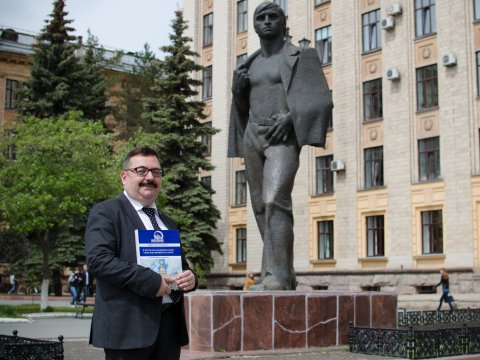On May 30th Ilya Dremenkov, head of the Laboratory of Neuropharmacology of the Center of Bioscience of the Slovak Academy of Sciences in Bratislava, associate professor of the Department of Food and Biotechnology of the SUSU School of Medical Biology, visited SUSU. He held a few lectures on the topic of nutrition and physical activity, about which we spoke with him.
– You offer lectures for students and teachers on the topic of the neuropsychophysiology of nutrition. Why is studying this issue important?
– In our time there is an evolution, a possibly unique one, not just for the human race but also for all of the living world. This literally happened in the last few decades. It’s difficult to imagine, but it’s true that today, much more people die from overeating than from undereating. This is a unique situation which has not occurred before in human history. All living things try to find themselves sustenance. They don’t always fight this battle for their existence. A person who has access to more food resources than necessary for normal consumption has psychological, somatic, and medical issues. The other issue is that the majority of what we eat today is processed food. People, like any living ting, have a mechanism developed over millions of years of evolution – eat the products and nutrients that you need right now. This mechanism as developed for natural products, and it doesn’t always work with highly processed foods which exist today. This is why eating disorders have become a massive issue and it’s tied with many psychological and somatic illnesses which are one of the most important reasons for non-employability in our time.–
– How long have you been studying this topic?
– I have been studying nutrition for a fairly short amount of time; earlier I studied the issues of depression and the mechanism of action for anti-depressants. We studied these mechanisms and, one might say, accidentally stumbled upon the mechanisms which play a role in the regulation of eating. I consider this a very important topic. The fact that I was offered a position here in the Department of Food and Biotechnology one year ago is a great honor for me, this opens up new possibilities to continue my research in this area.
– You also study the effect of physical activity on the central nervous system. Today, many people lead a life with a lot of sitting, how does this affect health?
– This is two sides of one issue. Typically, in all of the living world, you must first invest energy before you can achieve energy. This works in a system of investing and then profits from this investment. This mechanism works on the level of the cell, the body, and the whole species. Throughout all of history the majority of people received the minimum quantity of nutrients to survive. This suggests that even the smallest natural or social disaster, such as crop failure or war, led to the fact that many people died from starvation. Now, after the scientific and technological revolution which has reached its peak in the last decade, we find ourselves in a situation where we do not have to put forth physical effort to receive the necessary amount of nutrients. Furthermore, in industrialized countries more than half of the population is doing mental labor rather than physical. Even those who are technically doing physical labor don’t use completely physical effort thanks to high-technology manufacturing. So it’s important that people not only use their energy to achieve food, but also to find time free from this production of means of sustenance to dedicate to physical activity. Not everyone is able to do this; not everyone is motivated enough. In terms of both nutrition and physical activity. I believe that this issue can be solved using only scientific methods. We must study the mechanisms of the central nervous system which regulate our nutrition and physical activity and thanks to this understand how we can resolve the issue of low physical activity and excessive food intake which leads to a balance disturbance threatening the health of mankind in a global sense.
– Besides the aforementioned, you are a doctor of philosophy. Does this help with your research?
–My title is doctor of philosophy. This was awarded in the European academic tradition, where philosophy was considered the highest science, and the doctoral title was only given in philosophy. Unfortunately, I only studied one year. So, translating this into the Russian academic reality I am most likely a candidate of biological science.
– How do you plan on developing this area at SUSU as an associate professor of the Department of Food and Biotechnology?
– SUSU, as a multi-profile university with a technological orientation is the most fitting place for developing such a department. I believe that research should be placed into the basic study of the mechanisms of nutrition – I have long been interested in working on this topic with SUSU. My laboratory in the Academy of Science in Slovakia would be interested in cooperation in studying the basic neural nerve mechanisms of nutrition. Having understood the mechanisms of nutrition, their levels, which nerve stimulations are used by one food or another, we can develop a more appropriate technique for proper nutrition in the future. It would also be helpful to work between the Departments of Food and Biotechnology and the Institute of Sport, Tourism, and Service. Because, like I already said, nutrition and physical activity are two sides of one coin.




